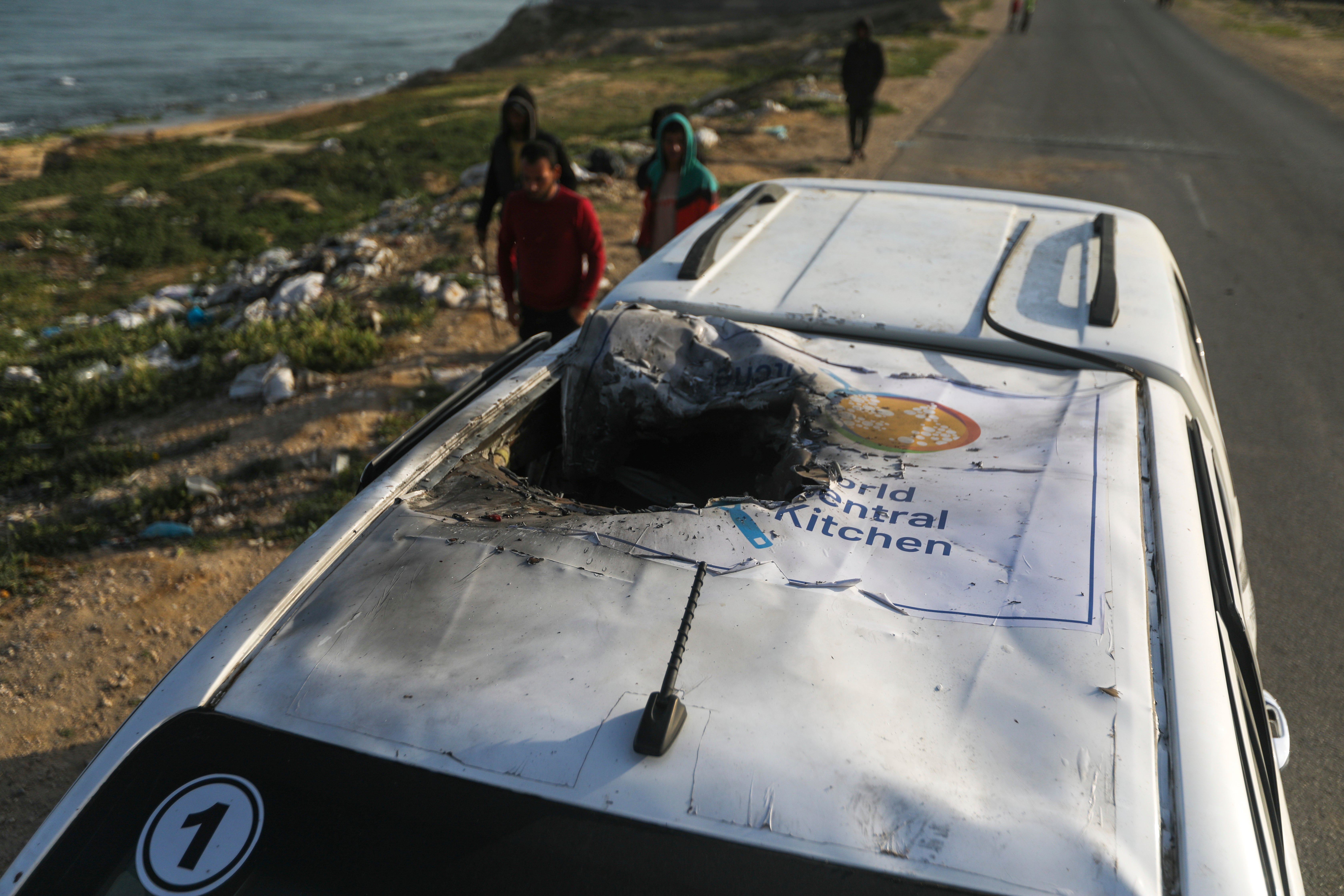Israeli drone used in Gaza aid strike powered by British-made engine, activists claim
Pressure mounts to halt arms sales as senior Tory calls airstrike a ‘turning point in Israel’s collapsing reputation’
Britain is accused of being complicit in Israel’s killing of seven aid workers in Gaza amid claims that weapons used in the attack were powered by UK-made engines.
Israel struck a World Central Kitchen (WCK) convoy carrying charity workers, including three Britons, with a Hermes 450 drone, according to Campaign Against Arms Trade (CAAT). It said the weapon – known as a “Zik” drone in Israel – could have been powered by a British component.
The three British citizens killed were named yesterday as John Chapman, 57, James “Jim” Henderson, 33, and James Kirby, 47. They were part of the security team.

The deaths, described by Benjamin Netanyahu as “unintended”, prompted an outpouring of anger as pressure grows on the British government to suspend arms transfers to Israel.
Senior Tory Sir Alan Duncan, a former foreign minister, was among those to speak out against the attack, describing it in The Independent as “a tipping point in Israel’s collapsing reputation” and asking whether Britain should reconsider Israel as an ally.

Citing figures from the Hamas-run Palestinian health ministry, he said: “As the death toll in Gaza has risen from 1,000 to 10,000 to 30,000, Israel’s justification for this excess feels ever less convincing ... Through its deceit and callousness, Israel has now lost the support of the world. Nobody any longer believes its statements.”
Shadow foreign secretary David Lammy joined the calls for the arms trade to cease, accusing his ministerial counterpart David Cameron of “going silent” on the question of whether or not Israel is complying with international humanitarian law in relation to the sales. “The law is clear,” he said. “British arms licences cannot be granted if there is a clear risk.”
Meanwhile:
- It emerged that more than 200 aid workers have been killed since 7 October, when Hamas terrorists killed 1,200 people
- Nearly 33,000 Palestinians have died, according to Hamas-run authorities in Gaza, in the retaliatory bombing campaign by the Israeli military
- The UN’s largest agency operating in Gaza, UNRWA, told The Independent that 176 of its staff have been killed since the war began, some of them while delivering vital aid
- Rishi Sunak warned Benjamin Netanyahu that Israel’s war in Gaza is growing “increasingly intolerable”
- Canadian prime minister Justin Trudeau said the attack on aid workers was “absolutely unacceptable” and called for “full accountability”
- US state department spokesperson Matthew Miller said the US wants the investigation into the attack wrapped up as soon as possible
As more details emerged about the bombing and its victims, CAAT accused the UK of being “complicit in the murder of UK aid workers” and said it must halt arms sales to Israel. The Independent has approached the Department of Business and Trade for comment.
“This government has had every opportunity to impose an arms embargo and has refused to do so. While our thoughts are with the families and friends of the aid workers killed, they are also with the families and friends of the tens of thousands of Palestinians who have been killed by Israel,” said spokesperson Emily Apple.
She cited claims that the Foreign Office is hiding legal advice that Israel is breaching international humanitarian law, according to foreign affairs committee chair Alicia Kearns.
Since 2015, the UK has licensed £487m worth of weapons to Israel, although this does not include equipment exported via open licences.

According to its own export licensing criteria, the UK must halt arms sales when there is a clear risk they could be used in humanitarian violations.
Israel has admitted launching the deadly strike on the convoy, saying it was unintended and “tragic”. The military promised that an independent inquiry would be held.
Military sources told Israel’s left-leaning Haaretz newspaper that the attack had involved Hermes 450 drones, and that the convoy had been pounded even though the vehicles were travelling in a deconfliction zone and the charity had coordinated its movements with the military.
Military experts in Israel told The Independent they also believed that Hermes 450 drones had been used. The Independent has approached the IDF for comment.
Jose Andres, the celebrity chef who founded WCK, said the strike had targeted his team “systematically, car by car”. The aid convoy was hit as it was leaving a warehouse in central Gaza after unloading more than 100 tonnes of food aid brought by sea.
Mr Andres said WCK had established clear communication with the Israeli military, which knew his aid workers’ movements. “This was not just a bad luck situation where ‘Oops, we dropped the bomb in the wrong place,’” he continued. “Even if we were not in coordination with the IDF, no democratic country and no military can be targeting civilians and humanitarians.”
The three Britons died alongside American-Canadian dual citizen Jacob Flickinger, 33, Australian national Lalzawmi “Zomi” Frankcom, 43, who was the leader of the relief team, Polish national Damian Sobol, 35, and Palestinian Saifeddin Issam Ayad Abutaha, 25.
The family of Mr Chapman, a former marine and a father of two from Dorset, said he “will forever be a hero”: “He died trying to help people and was subject to an inhumane act. He was an incredible father, husband, son and brother.”
The family of Mr Kirby, a military veteran believed to be a former member of Britain’s special forces, added that he was a “genuine gentleman” who was “always willing to lend a helping hand to anyone”.
Labour MP Clive Betts said Israel was behaving “completely irresponsibly and disproportionately in Gaza” and that the UK should not facilitate this by providing any weapons that are killing women, children and now aid workers as well.
“You can’t justify providing the arms that have been targeted at aid workers, and clearly, they are. It is bad enough what has happened in the last few months, but it is just getting worse every day.
“At some point, there have to be consequences for them doing things we have told them not to do.”
The Green Party renewed calls for a halt on arms exports to Israel, saying the deadly strike on the convoy showed again that the Israeli government is violating the terms of the licences under which arms are exported.
Carne Ross, a former Middle East diplomat and the party’s global solidarity spokesperson, said the claim that parts of the drone could have been produced in Britain “only strengthens the case for an immediate embargo”.
He added: “It is hugely disappointing, but sadly predictable, to hear calls to end arms exports coming only after Western lives have been lost. It comes too late for the thousands of Palestinian children slaughtered by Western-supplied bombs and bullets.”
Amnesty International spokesperson Oliver Feeley-Sprague said: “The provenance of the engines in this drone is yet another question that ministers must urgently answer.”
Rishi Sunak has so far resisted calls to end arms sales to Israel. Speaking to a weekly politics show run by The Sun, he said: “I think we’ve always had a very careful export licensing regime that we adhere to.
“There are a set of rules, regulations and procedures that we’ll always follow, and I have been consistently clear with Prime Minister Netanyahu since the start of this conflict that while, of course, we defend Israel’s right to defend itself and its people against attacks from Hamas, they have to do that in accordance with international humanitarian law, protect civilian lives and, sadly, too many civilians have already lost their lives.”
Israel has repeatedly denied breaking humanitarian law.
A Downing Street spokesperson said: “The UK operates one of the most robust and transparent export control regimes in the world. We continue to monitor the situation in Gaza. We welcome Israel’s commitment to a full, urgent and transparent inquiry into Monday’s attack and we want to see that happen very quickly.”
Join our commenting forum
Join thought-provoking conversations, follow other Independent readers and see their replies
Comments
Bookmark popover
Removed from bookmarks